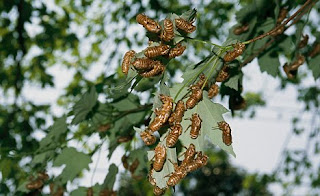AMMAN -- Small groups of locusts -- rather than swarms -- entered the Kingdom from neighbouring countries, but the situation is under control, the Agriculture Ministry said on Sunday.
Fedaa Rawabdeh, director of the ministry's plant protection department, said a small number of locusts appeared on Saturday in the Adasiyeh area in Southern Shuneh, in the capital's Wadi Seer and Naour neighbourhoods, and the Zboud area in Madaba Governorate.
But she stressed that the ministry's teams, joined by other agencies, sprayed pesticides over the areas invaded by locusts, which had come from Jericho on the western shores of the Dead Sea.
"All the locusts that appeared in these areas have been completely eliminated and the situation is now under control," Rawabdeh told The Jordan Times.
During the past three days, she said, a small number of locusts appeared in an area located some eight kilometres west of King Hussein Airport in Aqaba, but all were eradicated by the ministry's teams.
"The decrease in temperatures and the rainfall helped eliminate the locusts," Rawabdeh said.
Agriculture Ministry Spokesperson Nimer Haddadin on Saturday said that "very few" locust swarms appeared near Risheh and Bir Mathkour in Wadi Araba in Aqaba Governorate, but ministry personnel, in cooperation with other agencies, controlled the situation.
Rawabdeh affirmed that the situation in Jordan is "safe and there is nothing to fear", adding that the locusts which entered Jordan were remnants of the destructive insects being combated in Egypt, Saudi Arabia and Israel.
"The situation in Jordan cannot be elevated to the status of crisis level."
She noted that Jordan had been informed by the Food and Agriculture Organisation (FAO) about the existence of locusts in Egypt and Saudi Arabia and the possibility of the destructive insects coming to Jordan.
In response to FAO alerts, she said, the ministry opened seven emergency rooms in Aqaba, Tafileh and Maan to deal with any possible locust invasion.
Rawabdeh also said that the ministry has 73 vehicles in place and has deployed 67 locust observation expeditions all over the country, adding that teams from the Jordan Armed Forces and the public security, civil defence and Gendarmerie departments have also joined the locust-elimination efforts.
Citing FAO reports, she said locusts are not coming to Jordan in large numbers, but some small groups of the destructive insects are fleeing to the Kingdom from the combating campaigns in neighbouring countries.
"No matter what, the ministry is on a locust alert," she said.
© Jordan Times 2013
Fedaa Rawabdeh, director of the ministry's plant protection department, said a small number of locusts appeared on Saturday in the Adasiyeh area in Southern Shuneh, in the capital's Wadi Seer and Naour neighbourhoods, and the Zboud area in Madaba Governorate.
But she stressed that the ministry's teams, joined by other agencies, sprayed pesticides over the areas invaded by locusts, which had come from Jericho on the western shores of the Dead Sea.
"All the locusts that appeared in these areas have been completely eliminated and the situation is now under control," Rawabdeh told The Jordan Times.
During the past three days, she said, a small number of locusts appeared in an area located some eight kilometres west of King Hussein Airport in Aqaba, but all were eradicated by the ministry's teams.
"The decrease in temperatures and the rainfall helped eliminate the locusts," Rawabdeh said.
Agriculture Ministry Spokesperson Nimer Haddadin on Saturday said that "very few" locust swarms appeared near Risheh and Bir Mathkour in Wadi Araba in Aqaba Governorate, but ministry personnel, in cooperation with other agencies, controlled the situation.
Rawabdeh affirmed that the situation in Jordan is "safe and there is nothing to fear", adding that the locusts which entered Jordan were remnants of the destructive insects being combated in Egypt, Saudi Arabia and Israel.
"The situation in Jordan cannot be elevated to the status of crisis level."
She noted that Jordan had been informed by the Food and Agriculture Organisation (FAO) about the existence of locusts in Egypt and Saudi Arabia and the possibility of the destructive insects coming to Jordan.
In response to FAO alerts, she said, the ministry opened seven emergency rooms in Aqaba, Tafileh and Maan to deal with any possible locust invasion.
Rawabdeh also said that the ministry has 73 vehicles in place and has deployed 67 locust observation expeditions all over the country, adding that teams from the Jordan Armed Forces and the public security, civil defence and Gendarmerie departments have also joined the locust-elimination efforts.
Citing FAO reports, she said locusts are not coming to Jordan in large numbers, but some small groups of the destructive insects are fleeing to the Kingdom from the combating campaigns in neighbouring countries.
"No matter what, the ministry is on a locust alert," she said.
© Jordan Times 2013


No comments:
Post a Comment